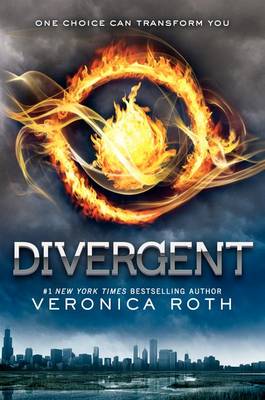Reviewed by teachergorman on
My verdict is …mixed. The fact that it’s a remarkably fast read doesn’t really win or lose the book any points for me. I’ve torn through books before because they were so good I couldn’t put them down. I also read Dan Brown’s The Da Vinci Code very quickly, rolling my eyes every time he described Audrey Tautou’s character as “incredulous,” which was about 400 times. Roth’s writing is certainly better than Dan Brown’s, but that compliment feels more like an insult than I intend.
The world of Divergent is genuinely interesting and engrossing. I love dystopias, and the use of factions based on virtues is interesting. Calling the factions “factions” is a bit on-the-nose, but I can forgive that in YA. The choosing of the faction, though cliché, is also forgivable in a YA coming-of-age story. Whether it’s the sorting hat or the Reaping or the shooting of a first deer, these moments are dramatic and speak to a longing in our culture for distinct coming-of-age rituals which we lack. I get that, and Roth handled that part just fine even if it wasn’t unique. The protagonist, Tris, isn’t sure whether she belongs in Slytherin, um, Dauntless or Hufflepuff, um, Abnegation, wrestles with the decision, and ultimately chooses a faction only to find that they are all flawed and none fit her perfectly. It works, and if it ain’t broke …well, a bit more creativity would be nice, but I can handle it.
Here’s what is broken and which must be fixed. The narrator, Tris, is a gawky, accident-prone, scrawny, pretty (but not too pretty) girl who thinks she is ugly. Since she’s the narrator, we are only exposed to her beauty by reading about all her self-doubts and then recognizing that they don’t fit with the reactions of the boys around her who find her attractive. I can forgive Roth for drawing from the archetypal coming-of-age myths, but do we need another Bella Swann or Katniss Everdeen? Katniss is better than Tris in that she has confidence in her hunting ability and her role as the provider for her family. Tris has more pride than Bella Swann, but she even feels guilty about that pride. At least Tris doesn’t have to get knocked-up by a guy who is more than a hundred years old on their honeymoon in order to discover her own self-worth by becoming a mother. Can we please stop telling teenage girls that, in order to be likable, they have to have unrealistically low opinions of themselves? This tend can’t be good for anybody.
It’s difficult to read around a protagonist who is unlikeable, but the other characters kept me going. Tobias/Four, the love interest, is genuinely interesting and somewhat complicated, at least until his unswerving adoration of Tris becomes clear. Then he just becomes a realistic swooning teenage boy, and that’s bearable, too. Considering his backstory, he could have been a lot more insufferable in his brooding. Points for Roth on that.
And why present tense? Writers, listen to me! Present tense is great for action sequences, so I can see why it appeals to people who are setting out to write fast-paced, action heavy books. If you have any sense that the time period covered by the book will extend for any prolonged period of time, resist this temptation, especially if the book is written in first person. Learn from Suzanne Collins’ mistake. After a second reading, I have grown to like Mockingjay, the third Hunger Games book, but I completely understand why it gets such mixed reviews from my students. In The Hunger Games trilogy. the first book happens over the course of a handful of days, so the present tense works. The second book happens over the course of a couple weeks, so it works, but slightly less well. The third covers a much longer period of time, but Collins couldn’t switch because she’d painted herself into a corner. Unless you can maintain the urgency of an action scene for the whole series (which would probably be exhausting for the reader and would lead to a lot of blunt exposition at the expense of more beautiful prose), don’t make this mistake. Better yet, write the thing in one tense, then rewrite it in another and see which works better. I suspect that, most of the time, you’ll find that the demand for intensity is overbalanced by the fact that we naturally tell stories in the past tense in our daily lives, so this compulsion to haste leads to a stiff, awkward writing style.
The most interesting element of Divergent is the mystery of how this seeming-utopia is breaking down and what that says about the virtues which under-gird it. We really only get to see that starting to play out in the last third of the book, so I’ll read the sequels to see if the series gets deeper into those questions of values and motivations. Also, my wife says Tris gets more likable. Color me skeptical. Still, I have to remind myself that The Lightning Thief, the first book in the Percy Jackson series, was painfully derivative of Harry Potter, but the series found its own way in the second book and ended up being pretty great by the end. Maybe the Divergent trilogy will find its own path and break free from some of the more well-worn elements of YA fiction in the second and third book.
Reading updates
- Started reading
- 25 March, 2014: Finished reading
- 25 March, 2014: Reviewed
